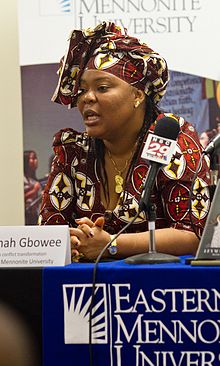Leymah Gbowee
| Leymah Gbowee | |
|---|---|

Gbowee in 2011
|
|
| Born |
Leymah Roberta Gbowee 1 February 1972 Central Liberia |
| Nationality | Liberian |
| Education | AA degree in social work, Mother Patern College of Health Sciences, Monrovia, Liberia; MA in conflict transformation, Eastern Mennonite University, Harrisonburg, Virginia, USA |
| Occupation | Peace activist |
| Known for | Women of Liberia Mass Action for Peace and Pray the Devil Back to Hell |
| Awards | 2011 Nobel Peace Prize |
Leymah Roberta Gbowee (born 1 February 1972) is a Liberian peace activist responsible for leading a women's peace movement, Women of Liberia Mass Action for Peace that helped bring an end to the Second Liberian Civil War in 2003. Her efforts to end the war, along with her collaborator Ellen Johnson Sirleaf, helped usher in a period of peace and enabled a free election in 2005 that Sirleaf won. She, along with Ellen Johnson Sirleaf and Tawakkul Karman, were awarded the 2011 Nobel Peace Prize "for their non-violent struggle for the safety of women and for women's rights to full participation in peace-building work."
Leymah Gbowee was born in central Liberia on 1 February 1972. At the age of 17, she was living with her parents and two of her three sisters in Monrovia, when the First Liberian Civil War erupted in 1989, throwing the country into chaos until 1996. "As the war subsided she learned about a program run by UNICEF,... training people to be social workers who would then counsel those traumatized by war," wrote Gbowee in her 2011 memoir, Mighty Be Our Powers. She did a three-month training, which led her to be aware of her own abuse at the hands of the father of her two young children, son Joshua "Nuku" and daughter Amber. Searching for peace and sustenance for her family, Gbowee followed her partner, called Daniel in her memoir, to Ghana where she and her growing family (her second son, Arthur, was born) lived as virtually homeless refugees and almost starved. She fled with her three children, riding a bus on credit for over a week "because I didn't have a cent," back to the chaos of Liberia, where her parents and other family members still lived.
In 1998, in an effort to gain admission to an associate of arts degree program in social work at Mother Patern College of Health Sciences, Gbowee became a volunteer within a program of the Lutheran Church in Liberia operating out of St. Peter's Lutheran Church in Monrovia, where her mother was a women's leader and Gbowee had passed her teenage years. It was called the Trauma Healing and Reconciliation Program (THRP), and it marked the beginning of Gbowee's journey toward being a peace activist:
...
Wikipedia
